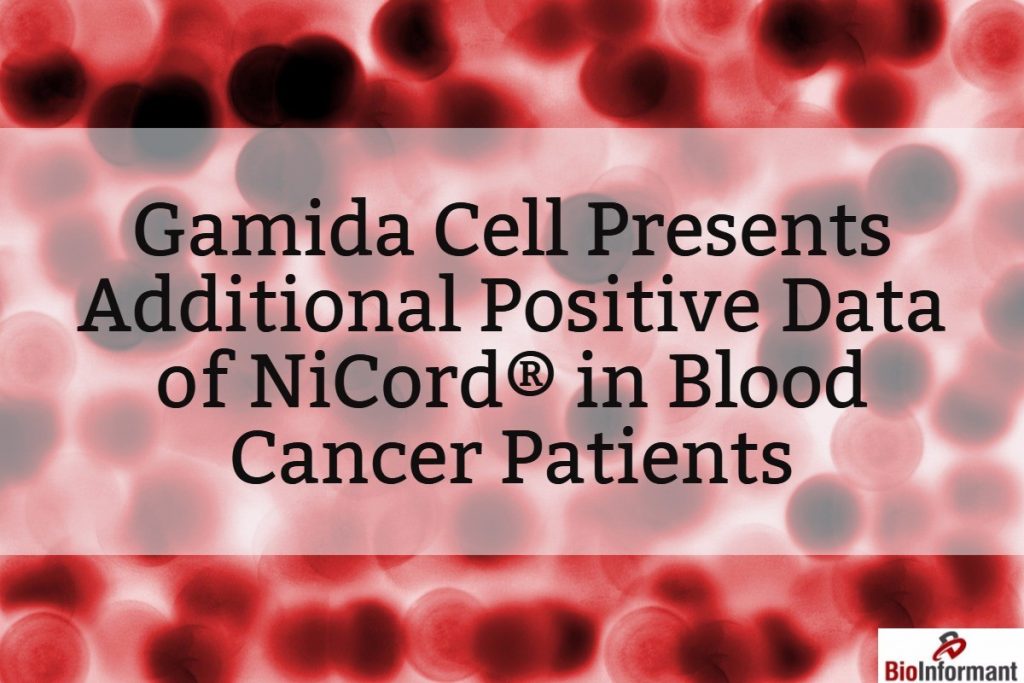Headquartered in Israel, Gamida Cell is innovative company that has become well-known for its unique approaches to hematopoietic stem cell (HSC) therapeutics. Although a small company at the time, Gamida Cell broke onto the global scene in 2003 when it announced a Phase I trial of its StemEx™ product for the treatment of leukemia and lymphoma patients.
StemEx™ was Gamida Cell’s first generation product for theex vivo (“outside the body”) expansion of cord blood stem cells, which can be utilized in hematopoietic stem cell transplantation (HSCT) to treat high risk cancers.
Although StemEx™ did not make it beyond Phase II/III trials, this expertise in ex vivo expansion of cord blood lead to the development of Gamida Cell’s current flagship product, NiCord®, and established Gamida Cell as a global technology leader for functional expansion of cells.
In major news released today, Gamida Cell announced additional positive results with the use of NiCord®, an experimental treatment for patients with high-risk blood cancers. To learn more, read the full press release below, printed with permission from Marjie Hadad of MH Communications, Press Contact for Gamida Cell.
Or, for more insights into Gamida Cell’s product and technology development, read my interview with Dr. Yael Margolin, CEO of Gamida Cell.
Gamida Cell Presents Additional Positive Data of NiCord® in Blood Cancer Patients at EBMT 2016
Data demonstrate rapid engraftment, reduced bacterial infections and shortened hospitalization
Jerusalem, Israel and Valencia Spain, April 5, 2016 — Gamida Cell, a leader in cellular and immune therapies for the treatment of cancer and orphan genetic diseases, announced today additional positive results with the use of NiCord®, an experimental treatment for patients with high-risk blood cancers.
The data was presented today in an oral session titled Transplantation of Ex vivo Expanded Umbilical Cord Blood (NiCord®) Results in Decreased Infection Burden and Hospital Length of Stay in the First 100 Days by Sarah Anand, MD and Mitchell Horwitz, MD, both from the Duke University School of Medicine and the Duke Cancer Institute, at the 42ndAnnual Meeting of the European Society for Blood and Marrow Transplantation (EBMT) in Valencia, Spain.
The analysis compared 18 patients with high risk hematological malignancies transplanted with NiCord to a control group of 101 similar patients transplanted with standard umbilical cord blood (UCB), following myeloablative conditioning. All of the patients were transplanted at the Duke Cancer Institute.
Dr. Horwitz said, “We saw a significant reduction in serious bacterial infections during the first 100 days in the NiCord group. This is encouraging because this type of infection is a major cause of early death following UCB transplantation. We also saw a significant reduction in hospitalization time in the NiCord group, indicating a faster recovery of these patients in comparison to those transplanted with standard umbilical cord blood. These results demonstrate that the rapid hematopoietic recovery from NiCord transplantation results in clinical benefit, in comparison to similar site controls.”
The results showed a statistically significant improvement (p<.001) in time to engraftment in NiCord patients of 12.5 days (95% CI 10-18) versus 27 days (95% CI 23-28) in the control group. Patients transplanted with NiCord also had a significantly lower frequency of grade 2-3 bacterial infections in comparison to the standard UCB patients, 22% vs. 54%, respectively (p=.015). And, during the first 100 days post-transplantation, patients transplanted with NiCord spent a median of 74 days alive and out of the hospital, significantly better than median 53 days (p=0.002) in patients transplanted with standard umbilical cord blood.
Gamida Cell president and CEO Dr. Yael Margolin said, “These data, in addition to the top line data from the Phase 1/2 study released in December 2015, define the potential clinical benefit of using NiCord as a graft source. We hope to further confirm these findings and establish the clinical benefit of NiCord in the upcoming randomized controlled Phase 3 registration study. Ultimately, we believe that NiCord can broaden the accessibility of transplantation to practically all patients in need.”
About Gamida Cell
Gamida Cell is a world leader in cellular and immune therapies for the treatment of cancer and orphan genetic diseases. The company’s pipeline of products are in development to treat a wide range of conditions including cancer, genetic hematological diseases such as sickle cell disease and thalassemia, bone marrow failure syndromes such as aplastic anemia, genetic metabolic diseases and refractory autoimmune diseases. Gamida Cell’s current shareholders include: Novartis, Elbit Imaging, Clal Biotechnology Industries, Israel Healthcare Venture, Teva Pharmaceutical Industries, Denali Ventures and Auriga Ventures. For more information please visit www.gamida-cell.com.
Press Contact:
Marjie Hadad
MH Communications
+972 54 536 5220
marjierhadad@gmail.com
Investor Contact:
Beth DelGiacco
Stern Investor Relations, Inc.
+ 1 212 362 1200
beth@sternir.com
About BioInformant
BioInformant is the first and only market research firm to specialize exclusively in the stem cell industry. BioInformant research has been cited by major news outlets that include the Wall Street Journal, Nature Biotechnology, Medical Ethics, and Vogue Magazine. Serving Fortune 500 leaders that include GE Healthcare, Pfizer, and Goldman Sachs, BioInformant is your global leader in stem cell industry data.
